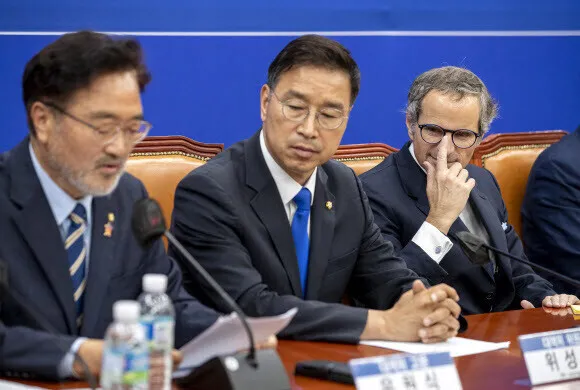hankyoreh
Links to other country sites 다른 나라 사이트 링크
Korea’s top opposition party lambasts IAEA verification as “biased toward Japan” in meeting with agency’s head

During a meeting with the head of the International Atomic Energy Agency (IAEA), Democratic Party lawmakers harshly criticized the agency’s comprehensive report that greenlit Japan’s plan to discharge contaminated water from the Fukushima Daiichi nuclear power plant into the ocean, calling its verification “biased toward Japan.”
Rafael Grossi, the IAEA’s director general, did not respond to the Democratic Party’s call for Japan to come up with alternatives to discharging the radioactive water, but he did agree with the suggestion that a consultative group of other international organizations should be established to verify the contaminated water.
Five lawmakers from the Democratic Party’s committee for blocking the dumping of the irradiated Fukushima water into the ocean met with Grossi for about an hour and 35 minutes at the National Assembly at the request of the Democratic Party.
In his opening remarks before the press, lawmaker Woo Won-shik, an advisor to the task force, said, “The IAEA has limited itself to only providing technical support for the discharge and a safety review of the Japanese government’s request, without examining other alternatives.”
Woo called the agency’s verification “biased in favor of Japan from the very beginning, which makes it lose all claims of neutrality and objectivity.”
“It is very regrettable that the report is a ‘self-verification’ and a study that was tailored to Japan without properly investigating the impact of the discharge on neighboring countries,” said Woo, who has been on a hunger strike for the past 14 days to stop the discharge of Fukushima contaminated water.
“If you think [the wastewater] is safe, I wonder whether you would be willing to suggest the Japanese government use that water for drinking or for industrial and agricultural purposes, rather than dumping it in the sea,” he said.
The task force’s chairperson, Wi Seong-gon, also expressed concerns.
"The IAEA has not reviewed criticisms regarding violations of the General Safety Guide in order to justify the discharge of contaminated water or identified viable alternatives,” Wi said. “Instead, it’s passed this responsibility to the Japanese government.”
He also pointed out that allowing the discharge of contaminated Fukushima water could “set the stage for the dumping of high-level nuclear waste into the ocean all around the world."
In his opening remarks to the lawmakers, Grossi stated that he “wholeheartedly understood” various worries and concerns. “Our conclusion has been that this plan, if it is carried out in the way it has been presented, would be in line, would be in conformity with the international safety standards,” he said.
A seemingly abashed Grossi smiled wryly when faced with the barrage of forceful remarks from lawmakers. Within the National Assembly building, cries of “Go home, Grossi” could be heard from citizens outside protesting the contaminated water’s release.
During the meeting, the Democratic Party proposed considering alternative approaches such as storing the radioactive material in solid form rather than dumping it in the sea and requesting that Japan postpone its schedule for releasing the water, but these suggestions received no response from Grossi, Democratic Party floor spokesperson Lee So-young said.
But she added that Grossi did seem to express his support for a proposal that the IAEA establish new governance with the World Health Organization and other international bodies to review and analyze the contaminated water issue.
“Director General Grossi acknowledged that today’s meeting would not be enough and indicated that he would seriously address the questions and proposals raised today,” she said.
The same day, the IAEA sent responses to 14 questions submitted in writing by the Democratic Party. The party plans to make the responses public after an internal examination.
By Lee Woo-yun, staff reporter
Please direct questions or comments to [english@hani.co.kr]

Editorial・opinion
![[Correspondent’s column] Coupang’s game in Washington follows familiar pattern [Correspondent’s column] Coupang’s game in Washington follows familiar pattern](https://flexible.img.hani.co.kr/flexible/normal/500/300/imgdb/original/2025/1226/8217667391873536.jpg) [Correspondent’s column] Coupang’s game in Washington follows familiar pattern
[Correspondent’s column] Coupang’s game in Washington follows familiar pattern![[Editorial] Coupang’s attempt to hide behind US won’t win back Korean consumers [Editorial] Coupang’s attempt to hide behind US won’t win back Korean consumers](https://flexible.img.hani.co.kr/flexible/normal/500/300/imgdb/original/2025/1226/1817667387971465.jpg) [Editorial] Coupang’s attempt to hide behind US won’t win back Korean consumers
[Editorial] Coupang’s attempt to hide behind US won’t win back Korean consumers- Coupang under fire for possible obstruction of investigation into its customer data leak
- [Editorial] Coupang founder’s contempt for workers, customer security knows no bounds
- [Column] Confessions of a Coupang-holic
- [Editorial] Kim Bom-suk’s arrogance on full display in boycott of Coupang leak hearing
- [Editorial] The facts of Yoon’s insurrection are clear — justice cannot be further delayed
- [Column] Trump destroys government
- [Column] A post-Western world approaches
- [Column] Offshore balancing, or carving out spheres of influence?
Most viewed articles
- 1Korea to trial next-gen train capable of sub-2-hour Seoul-Busan trip starting 2030
- 2Kim Jong-un’s hidden motive in criticizing South Korea’s nuclear submarine push
- 3[Editorial] Coupang’s attempt to hide behind US won’t win back Korean consumers
- 4Coupang under fire for possible obstruction of investigation into its customer data leak
- 5[Correspondent’s column] Coupang’s game in Washington follows familiar pattern
- 6Real-life heroes of “A Taxi Driver” pass away without having reunited
- 7Moon Jae-in renews call for end-of-war declaration, peace treaty on Korean Peninsula
- 8Chang Chun-ha’s family hopes to know truth of his death after 37 years
- 9Chinese money flooding into South Korean companies
- 10Russian architect personally witnessed Empress Myeongseong’s assassination by Japanese ronin, accoun